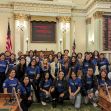The appellate court’s review of California Governor Gavin Newsom’s decision to allocate $80 million of state funds to help undocumented, unemployed workers during the pandemic is reminiscent of the old saying “It’s easier to ask forgiveness than it is to get permission.”
The Court of Appeal for the Second Appellate District, Division Five, ruled on November 17 to dismiss the appeal of orders from Judge Samantha Jessner of the Superior Court of Los Angeles County because the funds Newsom allocated were part of a one-time benefit program. Newsom had already spent the funds to help the state’s workers. In addition, there is was no indication that similar COVID-related funds would ever be reauthorized, so the appeal was declared moot. The unanimous decision of a three-judge panel was authored by Presiding Justice Lawrence Rubin.
Two private citizens, Cynthia Cerletti and Howard A. Myers, brought the action to challenge Newsom’s use of the funds, which came from the Disaster Relief for Immigrants Project. The case originated when Newsom declared a state of emergency on March 4, 2020. Twelve days later, California’s legislature amended its 2019 Budget Act to allocate $500 million for needs related to the state of emergency. Several safeguards were contained in the new bill. Funds could not exceed $1 billion, expenditures had to be approved by the state’s director of finance, and the legislature had to get notice. Each individual expenditure, however, did not need legislative approval.
Newsom announced a new Disaster Relief Assistance for Immigrants Project (the Project) on April 15. It established a $75 million Disaster Relief Fund “to support undocumented Californians impacted by COVID-19 who are ineligible for unemployment insurance and disaster relief” due to their status as immigrants.”
In the opinion, Rubin quoted a press release from Newsom that provided background information on the Project. It explained that about 150,000 undocumented Californians were to get $500 each to help them deal with problems that stemmed from the pandemic. Households were capped at $1,000. The money was to be distributed by regional nonprofits who had experience serving “underserved communities.”
The relief funds came from a few sources. First, some were reapportioned from other allocations targeted at immigrant assistance. Second, funds came from allocations from the state’s amended 2019 budget act. Newsom followed the legislature’s rules and received approval from the appropriate officials.
A little over two weeks after Newsom’s announcement, plaintiffs as taxpayers, sued Newsom, claiming the funds were unlawfully allocated. They claimed that federal law forbade undocumented immigrants from receiving any state or local public benefits. Soon after, they applied for a restraining order to stop the distribution of any Project funds. They also foresaw the reason for the trial court’s decision when they noted that unless a restraining order was granted, the funds will be spent and there would be no way to recover them.
Newsom opposed the restraining order, disputing the propriety of granting injunctive relief based on alleged harm.
The Superior Court denied the plaintiffs' application because “plaintiffs have not met their burden to support the requested relief.” Plaintiffs then sought a writ of mandate to compel the court to issue the injunction. This petition was also denied by the Superior Court, and the appellate court denied the petition on May 18.
Plaintiffs again appealed, filing a petition for writ of supersedeas, to stop the Project. Under the California Rules of the Court, the petition had to explain the necessity for the writ. Plaintiffs claimed the injunction was necessary to preserve their rights on appeal. This writ, too, was denied by the appellate court on June 12. The court cited precedent from the California Supreme Court that said “taxpayer harm is ordinarily insufficient to establish irreparable harm warranting preliminary injunctive relief.
Despite the legal disputes, the Project proceeded throughout the actions related to the plaintiffs’ request for a preliminary injunction. Newsom asked the court to note that all $75 million was already distributed as of August 17, 2020. Plaintiffs argued that the allocations did not make their appeal moot.
The appellate opinion began its disposition by citing “well-settled” law that said courts must decide only actual controversies. Precedent holds that “an appeal from an order denying an injunction may be dismissed as moot if the act sought to be enjoined is performed while the appeal is pending.” Judge Rubin reiterated that the Project only provided for a single payment and that it was spent more than a year ago. He wrote that exceptions can be made if “a moot case raises an important issue that is likely to recur, but that is not the case here.” He did not consider the possibility of another pandemic.
Plaintiffs, however, wanted the court to look ahead to prevent expenditures of illegal funds. The court distinguished the one-time COVID-related expenditure in this case from other, non-emergency allocations.
“This is not an appropriate case in which to exercise our discretion to reach the issue despite the mootness of the appeal,” he concluded.






